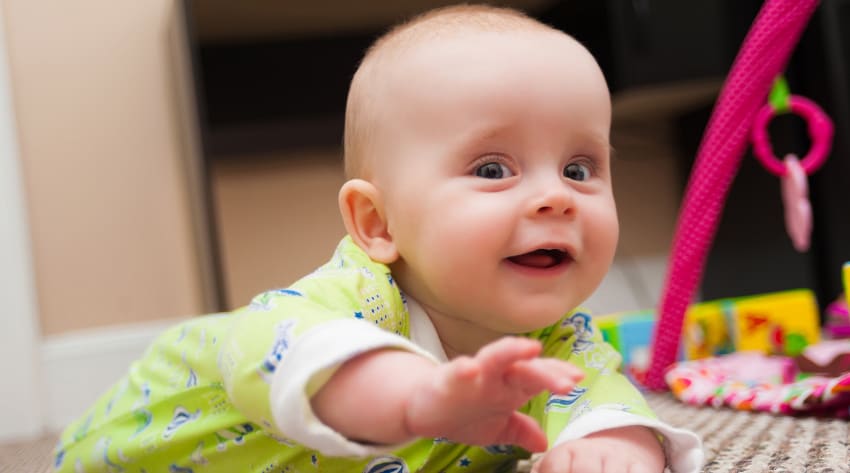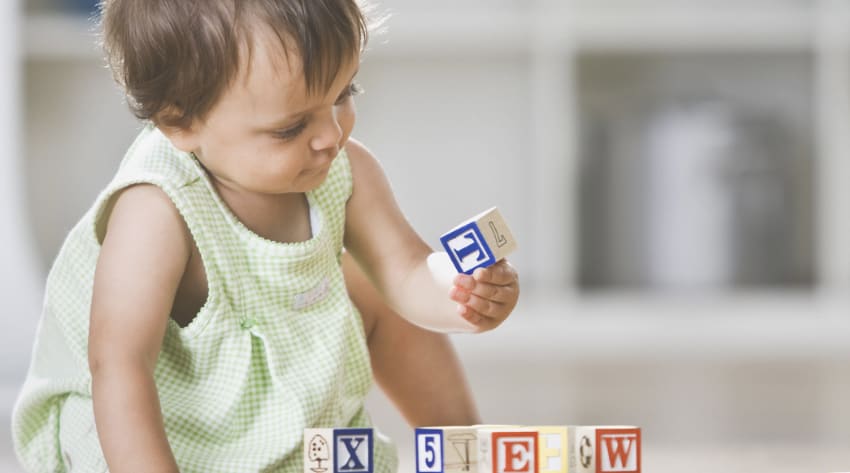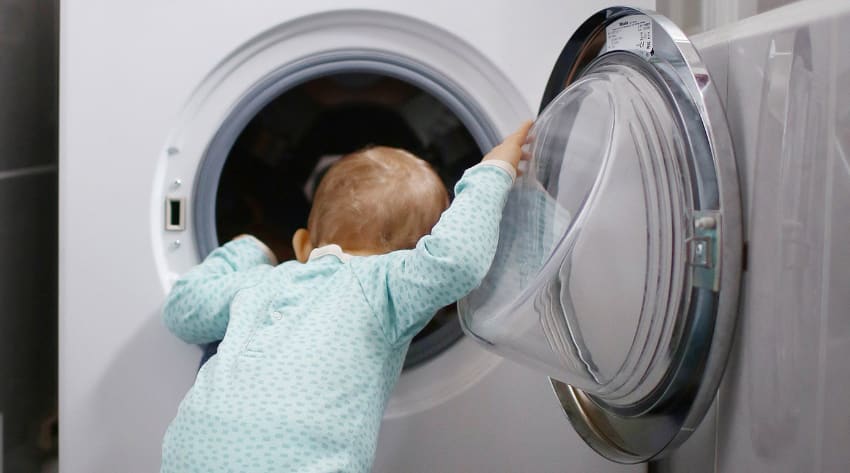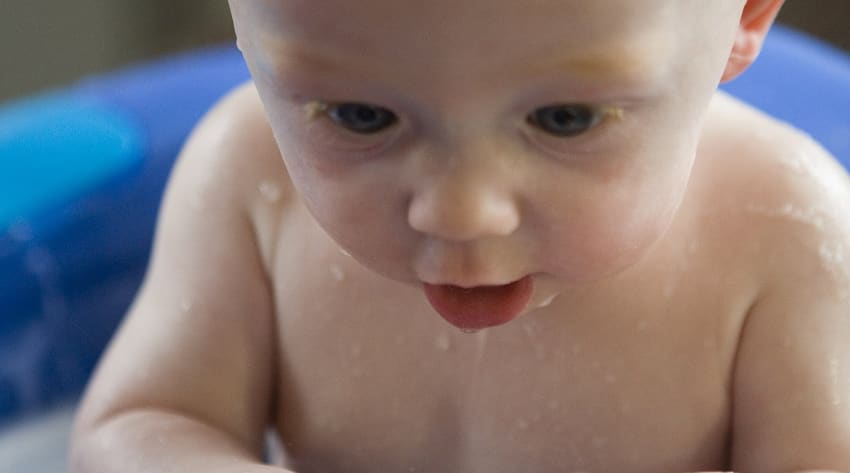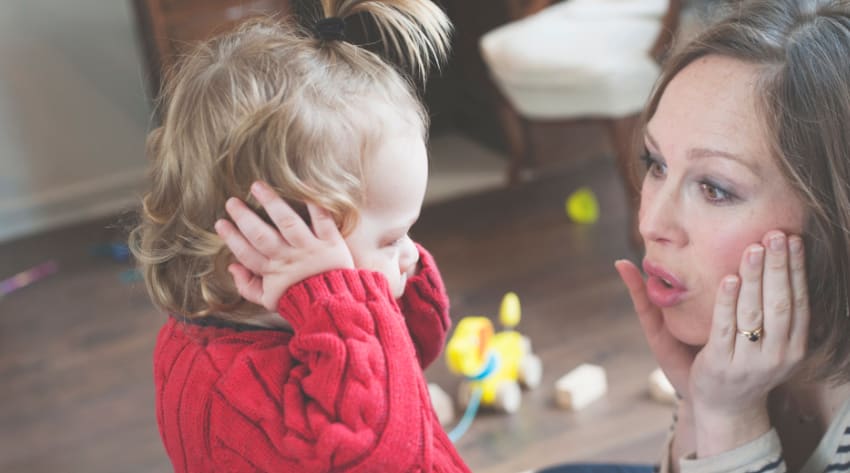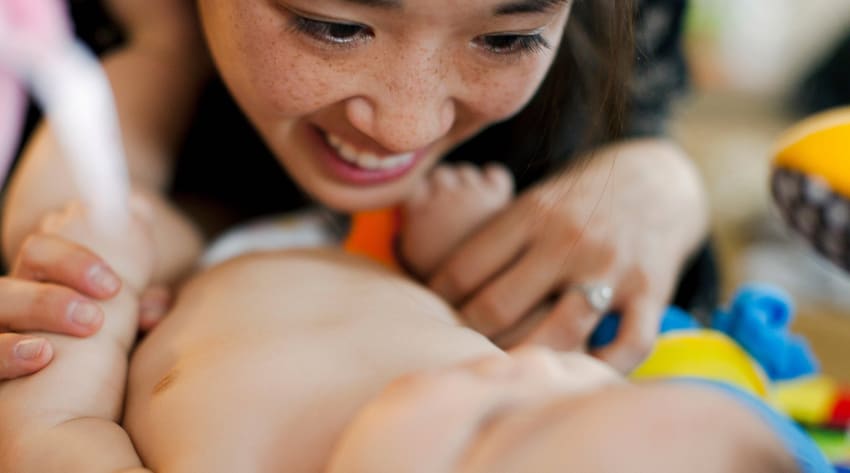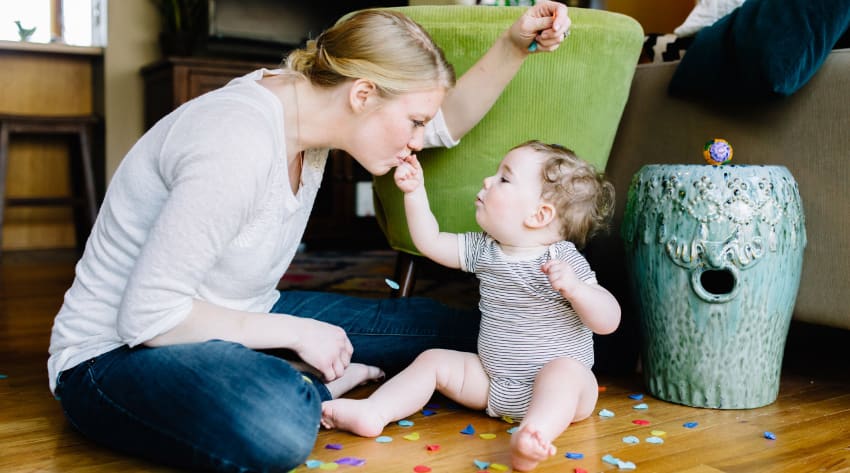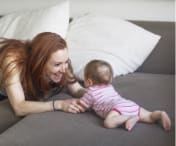At a glance
Lockdown activities for newborns 3-6 months
Lockdown activities for babies 6 months+
Lockdown activities for Toddlers 1 to 3 years
Activities for all days of the week
Keeping your baby happy and entertained is not always easy. So, we have come up with a selection of educational play activities for lockdown to cover all days of the week. The play activities are split between physical development, cognitive development, imagination, sensory play and balance and coordination so you can be reassured that your little one is also developing and learning through play. Remember to stick to health authority’s advice and wash your hands before and after playing.
Physical play activities for lockdown
Monday
3-6 months: Tummy time
When your baby is able to lift their head when lying on their stomach, tummy time helps to develop their neck and upper-body muscles for better head control. You can also play little baby developmental games at the same time.
- Roll a brightly coloured ball across their line of vision so they can track it with their eyes
- Place toys in front of your baby to encourage reaching, creeping and eventually crawling
- Don’t be afraid to join in on the tummy time. Lie down next to your baby and talk or sing to them
- Put a mirror next to the baby and watch them chat to the “other” baby
- Increase tummy time as your baby gets older
6-12 months: Obstacle course
Whether your baby is crawling or cruising this game is a lot of fun, and helps develop motor skills, coordination, balance and body strength. Always keep a close eye at all times and help guide your baby along.
- If space allows create a safe obstacle course in your living room using cushions
- Stay at ground level and guide your baby along, peeping out from behind the cushions every so often
- Use soft toys to place on top of the cushion to encourage them to climb
Toddlers: Dancing
Dancing is a great physical play activity for you and your little one to do together. It is also good for balance and coordination and building strength.
- Find your toddlers favourite music and set aside about 10 minutes of your day for dancing
- Work on repetitive dance moves for your child to follow and praise them when they get it right
- Be sure to show your enthusiasm and encouragement and enjoy plenty of giggles
Games for cognitive development during lockdown
Tuesday
3-6 months: Tickle rhymes
Simple repetitive rhymes are brilliant for improving your baby’s memory skills, and adding the tickling also makes it a lot of fun for you and your baby. Our favourite cognitive development games are ‘This Little Piggy’ or ‘Round and Round the Garden’.
- Sit on the floor with your little one
- Wiggle your baby’s big toe while you sing the first line of the rhyme
- Move on to the remaining toes whilst still singing
- When you sing the last line, give your baby a tickle or cover them with kisses
- Repeat the song a couple of times until your baby starts giggling in anticipation of the tickle at the end
This little piggy went to market
This little piggy stayed at home
This little piggy had roast beef
This little piggy had none
And this little piggy went
Wee, wee, wee, all the way home!
6-12 months: Hit the target
Ever noticed that your baby loves to empty things, whether it is your handbag, purse or the shopping. Why not turn this into a sensory activity game. Handling different objects will help your baby learn about size, shape and weight. It’s also a great way to introduce concepts such as empty and full, big and small.
- Fill a box with safe, interesting objects such as rattles, blocks and soft toys
- Help your baby pick up the box and turn it upside down
- Pick up toys and toss them in the box with your baby, saying out loud what each item is
- Then start over again
Toddler: Make your own photobook
Why not spare some time to get crafty (and we don’t mean in the mischievous way) and create your own photobook.
- You will need: Card and paper, pencils/crayons, stickers and some family photos
- Create the cover of the book with the card and the paper for the internal pages
- Leave a page for the photo and a page for writing about the photo: where it was taken, who is in the photo, date of photo etc.
- Whilst creating the book talk to your toddler about family, love and the importance of sharing. It is also a lovely way of introducing new members of the family, or family members that may live in other countries
Imaginative play activities during lockdown
Wednesday
3-6 months: Mirror Mirror...
This is a simple game but great fun to play at home. Sit in front of the mirror with your baby well supported. Make your baby find you by patting your reflection. Silly faces are encouraged.
6-12 months: Puppet show
Puppet shows can really help stimulate your baby’s imagination. Try to make them as interactive as possible with funny voices and lots of colour. Here are a few ideas:
- You can make finger puppets by cutting the fingers off old gloves. Add ears, eyes, nose and mouth by either drawing them on or sticking things on to create your own characters
- Alternatively you can use socks or envelopes to create your hand puppets
- Get the puppets to talk to each other, you can also get them to sing dance and tickle
- Get the puppets to talk to you and your child to make it as interactive as possible. They will love watching
Toddlers: Hide and seek
This is a great educational game which is a spin-off of the original game. You will need a few of your toddler’s favourite toys some blankets or boxes and general furniture.
- Take your toddler’s toys and place them under their blanket, inside or on top of a box or on general furniture
- Encourage your toddler to find the toys and pass them to you, tell them the name of the toy and get them to try and repeat it back to you
- For toddlers still taking their first tentative steps, place the toy on the sofa to encourage your little one to pull themselves up to a standing position
- Be sure to show your enthusiasm and encouragement with each toy that is found
Sensory play activities for lockdown
Thursday
3-6 months: Make your own baby rattle
Making baby rattles is really easy and is great for sensory play.
- Wash out a plastic screw top bottle, ideally a small bottle if you have one
- Pour dried lentils or rice into the bottle and put the screw top back on the bottle, make sure it is screwed tight
- Get some masking tape and secure around the top of the lid to ensure the lid can’t come off
- You might want to paint the outside of the bottle or add some stickers for extra colour. Be sure to use safe paints
- Shake the rattle around in front of your baby and allow them to shake the rattle so they learn how to make a noise with the rattle
6-12 months: Water play
All babies love playing with water. It doesn’t have to be at bath time it could be in the paddling pool or just in the sink with some kitchen utensils. Here are some great ideas to get started:
- In the bath try blowing bubbles or make some splashes with bath toys, your baby will be mesmerised.
- After bath time wrap your baby in a cosy towel and blow raspberries on their tummy
- You can use all sorts of kitchen items as water toys especially a colander, funnel, plastic cup, kitchen ladles or plastic bottles for pouring and squirting water. Just make sure all items have been thoroughly cleaned first
Never leave a young child alone with water.
Toddlers: Colour sensory basket
- Collect red objects with your toddler and put all the red objects into a basket or box
- Let your child explore the basket and name the objects and colour when they pick it up, for example “red truck"
Balance and Coordination play activities during lockdown
Friday
3-6 months: Baby push ups
Once your baby has mastered tummy time you can try baby push ups. This helps your baby with strength, balance and coordination. Try some of these play activities during lockdown:
- Lie your baby on their tummy and encourage you baby to push up on extended arms to lift their chest off the floor
- If your baby is struggling at first you can always roll up a blanket and place it under their armpits and place their arms/elbows in front of their shoulders over the blanket. This will encourage your baby to first prop on their elbows and eventually push up on their hands and lift their chest off the floor
- Use their favourite noisy toys or make fun sounds to encourage your baby to look up and push while on their tummy
6-12 months: Floating catch
This game is great for hand/eye coordination and is a gentle game that can entice lots of giggles.
- • Sit on the floor with your little one and throw a lightweight scarf into the air and catch it in your arms as it floats back down
- Tell your baby to hold out their arms and throw another scarf into the air so your baby can catch it
- Continue playing with both you and your baby catching the scarves. If you don’t have scarves try the bubble magic game
Toddler: Newspaper jumping
Imagination, energy and coordination is all you need.
- Use green sheets of paper to represent land. If you don’t have any don’t worry just use sheets of newspaper and your imagination
- Get your toddler to jump from sheet to another – taking care not to fall into the shark infested waters outside the sheets
Mix up games over the weekend to cover all areas of development
Saturday
3-6 months: Peek-a-boo
This is one of our favourite cognitive development games to play with young babies. Nothing quite gets that smile going than a good game of Peek-a-boo. But this game also teaches your baby about object permanence which is an important stage of cognitive development. Object permanence is the understanding that objects, or in this case a person, can still exist even when we can’t see them.
- Catch your baby’s attention maybe with a silly face and a noise
- Cover your eyes with your hands and then open them up and say “peek-a-boo”
- Remember to sound excited to make it fun for your baby
- Another version of this is to hide your baby’s face with a scarf or toy and ask where they are, then pull it away and say “here you are!” or “I see you”
6-12 months: Sensory bags
Sensory bags are so easy and cheap to make. Make sure you check the bag is well sealed each time otherwise you will have a big mess on your hands. Sensory activity is a great way for young children to develop their sense of creativity, touch and adventure. There are plenty of YouTube video to show you how to do it but we liked: https://www.youtube.com/watch?v=dblL9b-8GlM
You will need:
- Freezer zip lock bag
- Masking tape to seal the bag
- Washable paint
- Gel
- Rice
- Sparkles
Toddler: Bubble magic
Babies and toddlers are fascinated by bubbles. Sit your little one down (kitchen might be the best place) and blow bubbles around them. See how your child follows the bubbles with their eyes as they float down. Encourage your child to catch the bubbles, but remember to clean their hands afterwards.
Sunday
3-6 months: Copycat
As your baby's vision develops they will be able to follow moving objects and people, so even at a young age your baby will love imitation games.
- Start with something that your baby can already do such as form their mouth into an “O” or stick out their tongue
- When you’re eye to eye with your baby form your mouth into an “O” and see if they do the same
- You can then repeat with other facial expressions and noises and watch your baby as they try and imitate you
6-12 months: Box fun
You know that old saying that you buy a toy and babies are more fascinated by the box it came in. Well use that to your advantage through play. What’s more it will help your baby build their motor skills as well as learning about sizes, shapes, weights and cause and effect.
- Find some boxes such as cereal boxes, shoe boxes etc.
- Wrap the boxes up with newspaper or wrapping paper and allow your baby to handle them and learn to rip them open
- Alternatively gather the boxes with lightweight plastic bowls or yogurt pots and baby blocks. Work with your baby to build a tower and then take it in turns to knock it down and rebuild
Toddler: Pretend play
Toddlers love pretend play, it’s also great at developing their imagination skills.
- First gather some different types of toy foods and empty food cartons
- Role play to your child how these items are used then let your little one explore and role play back to you
- If your toddler uses the toy food in different ways or just drops them on the floor, try to get them to cook or wash the toy food instead
- Encourage your toddler to serve you the pretend food or have a tea party with their favourite teddy’s





